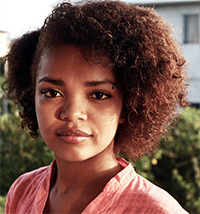GUYANA, much like many countries around the world, has had a very long complicated history with those who belong to the Lesbians, Bisexuals, Gays and Trans (LBGT) group.While those belonging to LBGT groups all have their struggles to bear with public reaction, trans-persons, particularly in the case of transvestite and trans-gender men are often discriminated against and abused on the basis of their appearances as they are not as readily able to toe the proverbial line of societal expectations and ideas about gender and sexuality.
That’s why for many, coming out is often a gruelling task which can see them going through life as social pariahs and are continuously denied certain basic human rights.
Over the years, there have been several cases in which trans-persons were targeted with some even being prohibited from entering court due to them being dressed in female clothing.
David Bissoon, who goes by the name Twinkle, is one of the ‘women’ who were turned away from the court after appearing to answer charges of assault laid against her, in conventional female clothing.
Long before that incident which shot her to fame in social-rights circles however and long before David became Twinkle and had any real sense of gender and sexuality, she knew she was very different.
Growing up in the small village of Best in Region Three, Twinkle from the age of nine constantly feared that she would be put out of her parents’ home as she was constantly warned that if she was different, she would have to leave. “They’d say if you’re gay, you’d have to come out of this house.”
It was Twinkle’s relentless playing with her female cousins and the “feminine” way in which she would act and dance which caused her parents to believe she was gay, as they did not understand the difference between gender identity and sexual identity.
“Sometimes, I would get away and sleep with my cousins clothing at night, because that was my comfort clothing, I felt like me in them.”
After several years of keeping her true self under lock and key, Twinkle, at the age of 17, finally decided to begin wearing female clothing openly. While the stigma she faced was difficult, the peace of mind she finally felt helped to balance all of that out.
“Every day dealing with society I am still faced with verbal, physical and emotional threats in some way or the other, but I am comfortable with me and that’s what matters,” she said.
However, it was not until a year later on her 18th birthday that Twinkle fully accepted herself as a trans-woman and stopped letting the fear of being discriminated against hinder her as she was able to come to terms and be proud of who she was.
So, how did Twinkle become Twinkle? Interested in going up for a local pageant, she realised that she would have to use a female name.
“At the time I had a whole lot of ideas circling in my head and a friend of mine told me to just take Twinkle and I thought this name suits me. My interpretation of Twinkle is someone that shines, not only for themselves, but also for others. Just like how I would shine not for myself but for the trans-gender community and the rest of my trans-committee who suffer and bear the brunt of stigma, discrimination, police brutality, family rejection, poor or no access to jobs, public transportation, shelter, most importantly lack to [sic] proper education due to trans-phobia in schools and access to judicial buildings.”
Twinkle believes that while there is a lot of work being done amongst non-governmental organisations in Guyana to encourage tolerance for the LBGT group, there are not enough resources available to do all the work that needs to be done.
Also, she is of the view that Parliament is not doing as much as it can or should be doing to encourage tolerance and to protect LBGT rights.
“I’m not saying that we want special rights, we only want basic human rights which are being denied and violated at every level of society. There is a big gap in access to human rights and equality for LBGT people, especially trans-gender women like myself who always dress in female attire and this needs to not only be addressed, but fixed.”




.png)









